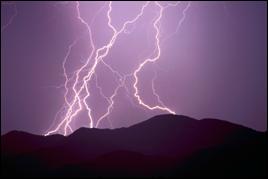Protecting Submergible Pump from Lightning
Question from newsletter member:
 Mike,
Mike,
I have a 150’ ground water well with a steel encasement, the well has a submergible pump located at the bottom of the well with a ground wire going to the pump.
The steel pipe/encasement for the submergible pump is not grounded to the electrical system. The pump seems to burn out and trip the breaker for no apparent reason.
I am thinking of grounding the steel pipe/encasement to the submergible pump ground wire, due to lightning traveling down the ground wire 150’ to the pump housing. However, I am not sure if that will only make the problem worse, due to more surface contact with the earth. This site is located in the Florida Everglades with lots of lightning, any recommendations?
Chuck Maxfield
Apex Electric
Mike asked his friend John West with Power & Systems Innovations, Inc. to respond:
Most wells are installed without consideration of the impact the earthing effect of the casing and what can happen with nearby lightning events. The energy of lightning is not predictable, but most often it follows any and all paths that present a lower potential. Lightning traveling in the ground will see the well casing the same as lightning in the air would see a 150’ tower. It will couple with the casing and follow the conductors of the pump back to the “lower” potential. That most often will burn the pump out. There are two things you can do; bond the casing to the service ground and install a good performance TVSS (surge protector).
If I understand the installation (if I don’t please correct me) the well casing is not bonded or connected in any manner to your electrical service ground bond. There is no doubt the well casing is the best ground you have available. As you have stated it is probable the pump damage has resulted from lightning.
Part 1: I recommend you bond the well casing to your service entrance grounding. The distance between the well and your electrical service would determine the size of the conductor. Our firm uses 4/0 bare stranded conductor in most cases. In corrosive or salt soil areas we use tinned wire. The larger the size of the bonding conductor the better. The well casing may be “pickled” steel and if so you will need to use a bi-metal clamp to transition from the steel to copper. The key is surface area…. if necessary use some Penitrox, but make 100% sure you have a very solid connection as it can be under severe stress during a lightning event. Most of the energy during a lightning event will follow the “bond” you have created and not end up burning up your pump motor. I recommend you verify the service ground is 25 Ohms or less and the X/O bond is well made. The well casing will act as a shield (such as conduit can for the wire inside) and keep the energy away from the pump motor.
Part 2: Install a substantial (50-100kA per mode) TVSS at the well (my preference) or on the panel feeding the well. If the circuit is less than 40-amps (any single phase voltage) there are series installed TVSS rated at 72kA available. You cannot have too much surge protection when lightning is involved. My own home has a well for irrigation I have a robust panel surge protector installed on the main panel and series connected on both my well and AC unit.
Our firm has worked with US Sugar, numerous growers and Bonita Springs Utilities to solve similar issues. If I can assist further please contact me.
One major grower we have worked with has over 200 wells. Most are three phase and over 100hp. Bonding the service entrance to the well casing along with surge protection stopped all but a very few of their pump motor damage issues. US Sugar told me the combination all but stopped their damage and also significantly lowered their unexplained failures.
Nothing is “lightning proof” but I am sure you will see a significant lowering of the damage…….
John N. West, Sr.
Power & Systems Innovations, Inc.
P.O. Box 590223
Orlando, FL 32859-0223
Phone: (407) 380-9200
Fax: (407) 380-3911